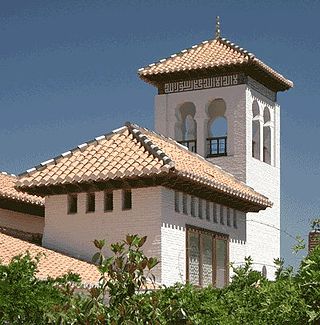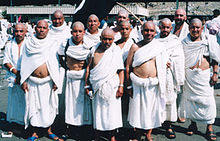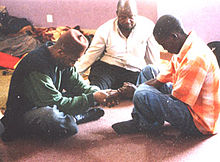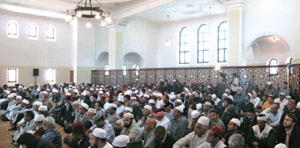- Murabitun World Movement
-
The Murabitun is a worldwide Islamic movement founded by Shaykh Dr. Abdalqadir as-Sufi, leader of the Darqawi-Shadhili-Qadiri Tariqa, with communities in around 20 different countries.
Its principal objectives include the restoration of Zakat, Da’wa, the practice of Bayat (allegiance) to an Amir, the re-introduction of the Islamic currency of Gold Dinar and Silver Dirham, and the establishment of the ‘Amal Ahl al-Madinah.
History
Heritage and Historical Antecedents
The name Murabitun means “People of the Ribāṭ” and derives from the famous Islamic movement led by Yusuf ibn Tashfin, which restored Islam in Andalusia. The term Ribāṭ ("fortified outpost") is defined by Ibn Rushd al-Jadd (the grandfather of Ibn Rushd) as "holding fast to outposts of the Islamic lands in order to protect the Muslims therein,"[1] and also refers to the outposts themselves. Its root appears in the Qur’an as the command rabitu.[2].
Modern History
The founder of the modern Murabitun movement, Shaykh Dr. Abdalqadir as-Sufi (a convert to Islam born Ian Dallas in Ayr, Scotland), met his first Shaykh, Muhammad ibn al-Habib in Meknes around 1968, and was made Muqaddem and given the title “As-Sufi”. Shaykh ibn al-Habib said to him, “You can stay here with me, and something might happen. But go to England and see what will happen,”[3] and so he went to London and gathered a group of new British Muslims, returning to Morocco in 1970. That group grew continuously, founding a learning centre in Bristol Gardens, London, in 1972, and another centre in Berkeley, California.
There was a constant flow of people into Islam around Muqaddem Abdalqadir as-Sufi, who during that period travelled constantly in Europe and America, held talks, and published works such as The Way of Muhammad[4] and Islam Journal proposing that Islam could be understood, and entered, as the "completion of the Western intellectual and spiritual tradition"[4]. He also initiated some important translations into English of classical texts on Islamic Law and Sufism, including The Muwatta of Imam Malik[5] and the Letters of Shaykh Darqawi, published as The Darqawi Way.
In 1982 Shaykh Abdalqadir as-Sufi held a series of talks in America which were to become the basis of his seminal work, Root Islamic Education[6]. He had arrived at the position that the practice of Sufism led by necessity to a full working commitment to the establishment of the social practices and structures of Islam. Around that time the communities of Muslims founded by him began to organise themselves under the leadership of Amirs, in emulation of the practice of the first Muslim communities. This period saw the emergence of communities in Malaysia, South Africa, Denmark, and the growth of a strong community in Spain.
After periods in Spain and Scotland, Shaykh Dr. Abdalqadir as-Sufi moved to Cape Town, South Africa in 2002, from where he offers guidance to the Murabitun movement and to the world Muslim community in general.
Position on Zakat
The political and social work of the Murabitun centres around the restoration of the “fallen pillar”[7] of Zakat, which, it is claimed, has been abandoned on several primary counts.
Principally:
- that it must be taken by an Amir[8]
- that if it is on money it must be taken in gold and silver[9]
- that it must be disbursed immediately.
As their authority for this position the Murabitun cite a wide range of sources, beginning with the Qur’anic injunction to take Zakat[10], the Prophetic practice of Zakat-taking, the well-known position of the Khalif Abu Bakr as-Siddiq[11], and the established practice among the world Muslim community which was until relatively recently the assessment and collection of Zakat by the Leader and his collectors.
This they place in contradistinction to the currently prevailing practices of voluntary self-assessment, donation to the Zakat charity of one’s choice, and the placement of Zakat donations into interim or even long-term investment funds. This, they argue, destroys the political cohesion of the Muslim community, which is based primarily on the circulation of wealth along Divinely revealed lines[12]. They also condemn Zakat investment funds as un-Islamic.
Shari‘ah Currency
Connected with their position on Zakat is their perhaps more widely known work promoting the Islamic Gold Dinar and Silver Dirham, which has been developed above all by the scholar Umar Ibrahim Vadillo. Paper money, since actually a promise of payment written on paper, can from the point of view of Zakat only be considered in terms of its value as paper[9], since Zakat cannot be discharged by passing on a token of debt owed to a third party. Vadillo has written extensively[13] on the origins of paper money and the Islamic position on money.
The Murabitun trace the bi-metallic currency back to the Messenger Muhammad and the first Muslim community; its specific weights and purities were formally recorded by ‘Umar Ibn al-Khattab[14], [15]. They also cite the Dinar’s mention in the Qur’an[16], its use in the universally accepted fiqh to define the terms of Zakat, and its mention as currency throughout the entire body of Islamic Fiqh.
Amirate, Sultaniyya, Khalifate
The Murabitun advocate Personal Rule as the Islamic and indeed natural form of human governance[17][18], taking authority for this position from extensive Qur’anic references[19], the Sunna of the Prophet himself, extensive Hadith, the consensus of the scholars[20], and the practice of all the subsequent Khalifs, Sultans and Amirs of every significant Muslim society until the cessation of effective Ottoman sultaniyya in 1909.
Da’wa
The Murabitun began as and remains a Da’wa movement, inviting people of all races and social walks to accept Islam. Their gatherings are characteristically multi-racial, and their largest numbers of adherents are from the indigenous tribes of Southern Africa and the Central American Indians, while indigenous European Muslims of the first and second generation also feature prominently.
‘Amal Ahl al-Madinah
Shaykh Abdalqadir as-Sufi entered Islam in Morocco, and this has been misinterpreted as the reason for his promotion of the school of jurisprudence of Imam Malik. His advocacy of Malik’s School of Madinah is explained at length in his seminal work Root Islamic Education, in which he argues that the record left by Malik – as the inheritor of the lived social reality of the first three generations of Muslims in the city of the Prophet (as opposed to the other Schools, which were formulated in other places), and as the first formulator of Islamic Law – is necessarily and far and away the closest to the complete Islamic blueprint required for the revival of Islam in times of advanced degeneration (i.e. the present day). The Murabitun do not, however, in any way dispute the validity of the other legal Schools[21], nor is adherence to or advocacy of the Madhhab of Malik a condition of membership of the Murabitun.
Islamic Trading and Social Welfare
The Murabitun advocate a revival of the forms of trading and social welfare practiced during the first generations of Muslims and for most of the history of Islam, proposing that these are the natural modes of human activity and rejecting the dielectical categorisation of “ancient” or “modern”, a set of opposites whose application to Islam they consider irrelevant and misleading[22].
These models have been formulated in detail and include Awqaf[12] for the funding of social welfare institutions, mosques and other public facilities; markets governed by rules such as the prohibition of charging rent for market-space; guilds as the natural form of professional organisation; and caravans, representing the movement of goods from point of purchase to point of sale as opposed to monopoly distribution.
Umar Ibrahim Vadillo has been instrumental in formulating these modules in terms of the modern technological world.
Position Against Terrorism
Shaykh Dr. Abdalqadir as-Sufi has consistently identified terrorism and suicide tactics as forbidden in and alien to Islam, and indeed as a phenomenon with no precursor in Muslim history. Instead, he then states, its original appearance as a tactic and a psychology was among the Isma‘ili sect of the Shi‘a religion, and it later emerged among the Russian nihilists of the late 19th century[23]. The Murabitun have also consistently separated themselves from the personnel and ideology of terrorism.
Organizational Form
The Murabitun advocate Bayat (allegiance) to Amirs and leaders among the Muslims in general, arguing that this is and always has been the mainstay of Islamic political organisation. Accordingly they also organise themselves around Amirs. This is distinct from the role of the movement’s founder, Shaykh Dr. Abdalqadir as-Sufi, who, while exercising an undoubted influence, is a spiritual guide rather than a political leader – an arrangement common throughout the history of Islam[24][25].
There are no formalised rules of membership or affiliation to the Murabitun, rather the movement consists of individuals and groupings seen as actively working towards the Murabitun’s aims while acknowledging affiliation. As such it is not a political party with official membership or a fixed programme or even ideology.
Tariqa
Many but not all members of the Murabitun are also Sufic murids of its founder, Shaykh Dr. Abdalqadir as-Sufi, and as such are also members of the Qadiri-Shadhili-Darqawi Tariqa.
Political Influence
The Murabitun have had considerable political influence, principally in the sphere of the Islamic Gold Dinar and Silver Dirham. Dr. Mahathir Mohamed[26], former Prime Minister of Malaysia, Dr Necmettin Erbakan, former Prime Minister of Turkey, and King Hasan II of Morocco, during their terms of office or rule issued public statements in favour of the Gold Dinar as a currency for Muslim nations. Dr Mahathir and King Hasan II also initiated programmes and activities towards the currency’s implementation, the latter as a means to correct Zakat.
Controversial Stances
The Murabitun have been opposed from some quarters because of their outright rejection of suicide as a tactic (see section above). Similarly, their absolute stance against the “Islamisation” of banking, which they claim is the abandonment of Islamic practice[27], has led to opposition, particularly among the Modernist school, who either accept paper money as an unavoidable part of the status-quo (darurah), or avoid the issue of the Gold Dinar and Silver Dirham altogether.
Notes
References
- ^ Kitāb al-Muqaddimāt of Ibn Rushd al-Jadd (vol.1, pp.275-6)
- ^ "be firm on the battlefield" Sura Ali 'Imran 3: 200
- ^ From “The new Murabitun” by Umar Ibrahim Vadillo, Yildiz Productions, 1999
- ^ a b The Way of Muhammad
- ^ The Muwatta of Imam Malik
- ^ Root Islamic Education
- ^ Bewley, Abdalhaqq, Zakat: raising a fallen pillar, Black Stone Press, UK, 2001
- ^ For Example: "The zakat is fard and one of the fundamental matters of Islam, such that whoever denies that it is obligatory is a kafir." And "It is obligatory to pay zakat to the amir (Imam) if he is just. If he is not just and it is impossible to divert it from him, then one pays it to him and that discharges one's duty, but if it is possible to divert it from him then the person paying it should pay it to those who can validly receive it but it is recommended that one not undertake to pay it directly oneself for fear of praise." Al-Qawanin al-Fiqhiyya, Ibn Juzayy al-Kalbi
- ^ a b For example: Al-Fath al-‘Aliyy al-Malik fi al-Fatawi ‘ala Madhhab Malik, Shaykh Muhammad ‘Illish, Al-Azhar
- ^ “Take zakat from their wealth” Surat Tawba 9:103
- ^ "Fight them if they retain only a hobbling-rope of what was collected before." Al-Bukhari in his Sahih in the Book of Zakat, in the chapter on the obligatory nature of zakat
- ^ a b Shaykh Abdalqadir as-Sufi, Sultaniyya, Madinah Press 2001
- ^ A fatwa on banking in Islam by Umar Ibrahim Vadillo is available here, Fatwa on Banking
- ^ At-Taratib al-Idariyya, Shaykh al-Kattaani
- ^ Abu Bakr ibn Abi Maryam reported that he heard the Muhammed say: "A time is certainly coming over mankind in which there will be nothing [left] which will be of use save a dinar and a dirham." (The Musnad of Imam Ahmad ibn Hanbal)
- ^ “But there are others among them who, if you entrust them with just a single dinar, will not return it to you.” Surat Al‘Imran 3:74
- ^ Sultaniyya is a modern statement on leadership in Islam. Abdalqadir surveys Islam under the chapter headings Deen, Dawla (polity), Waqf, Trade, the Sultan — personal rule — and Tasawwuf. (Madinah Press, Cape Town, 2002, OCLC: 50875888)
- ^ Sultaniyya
- ^ Surat An-Nisa 4:58
- ^ Jawharat at-Tawhid, Al-Laqqani, with Commentary by Al-Bayjuri, and Al-Aqida an-Nasafiyya, with Commentary by At-Taftazani
- ^ Discourse on the Four Madh'habs by Abdalhaqq Bewley
- ^ Ian Dallas, The Time of the Bedouin, Budgate Press 2006
- ^ Fatwa on Suicide as a Tactic, Madinah Press 2004.
- ^ The Ottoman Empire 1300-1600 by Halil Inalcik, Orion, 2000, ISBN 1842124420
- ^ Abdallah ibn Yasin
- ^ Dr Mahathir Mohamed Speaking at the Gold Dinar Convention in Kuala Lumpur in 2003
- ^ Vadillo, Umar Ibrahim, Fatwa on Banking, Madinah Press 2007
- Website of Shaykh Abdalqadir as-Sufi
- The Noble Qur'an: a rendering of its meaning in English. Abdalhaqq and Aisha Bewley, (Bookwork, Norwich, UK, ISBN 1-874216-36-3)
- The Way of Muhammad (Diwan Press, 1975, ASIN: B0000D74TC)
- The Muwatta of Imam Malik translated by Aisha Bewley and Ya'qub Johnson, (Bookwork, Norwich, UK, 2001, ISBN 0906512174, ISBN 0710303610)
- The Letters of Shaykh Moulay Muhammad al-Arabi al-Darqawi (published as The Darqawi Way) translated by Aisha Bewley (Diwan Press Norwich, UK, 1980, ISBN 0906512069)
- Root Islamic Education, written on the school of the people of Madinah under the leadership of Imam Malik (Madina Press, June 1993, ISBN 1874216053)
External links
Categories:- Islamic organizations
Wikimedia Foundation. 2010.






